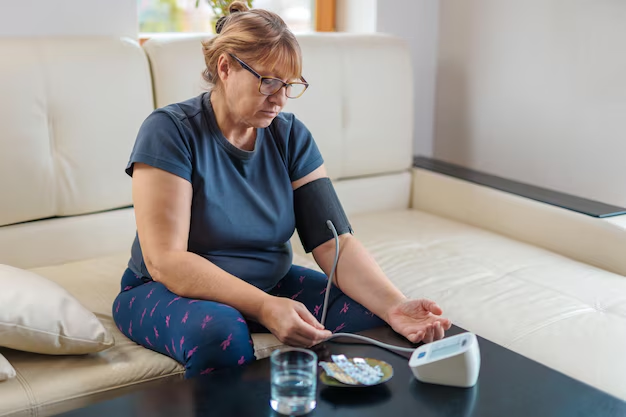Your Guide to Is Hypertension Heart Disease
What You Get:
Free Guide
Free, helpful information about HyperTension FAQ and related Is Hypertension Heart Disease topics.
Helpful Information
Get clear and easy-to-understand details about Is Hypertension Heart Disease topics and resources.
Personalized Offers
Answer a few optional questions to receive offers or information related to HyperTension FAQ. The survey is optional and not required to access your free guide.
Understanding the Connection: Is Hypertension Considered Heart Disease?
When you hear the term hypertension, your thoughts might not immediately jump to heart disease. However, understanding the connection between these two can be crucial in managing your health proactively. So, is hypertension heart disease? The answer is a bit nuanced.
Hypertension: A Silent Contributor
Hypertension, commonly known as high blood pressure, isn't heart disease in itself. Instead, it is a critical risk factor. It refers to the force of blood against your artery walls. When this pressure remains consistently high, it can cause damage to the heart and arteries over time, leading to heart disease. The condition is often deemed a "silent killer" because many people experience no symptoms until significant damage has occurred.
How Hypertension Leads to Heart Disease
High blood pressure can cause the arteries to harden and narrow (atherosclerosis), which decreases blood flow to the heart and can contribute to coronary artery disease. Additionally, it strains the heart, potentially leading to conditions like heart failure, where the heart struggles to pump blood efficiently. Furthermore, hypertension can lead to complications such as stroke, kidney disease, and vision problems.
Key Indicators of Heart Disease from Hypertension:
- Chest pain or angina
- Shortness of breath
- Irregular heartbeat
Proactive Measures and Assistance
Preventing hypertension from escalating into heart disease involves lifestyle changes such as a balanced diet, regular exercise, reducing sodium intake, and managing stress. Regular monitoring and working closely with a healthcare provider are essential steps.
For many, financial barriers can hinder effective management of hypertension and heart disease. Fortunately, there are government aid programs and other forms of assistance available to help manage healthcare costs.
Financial Assistance and Support Programs
If managing hypertension or heart disease seems financially daunting, exploring financial aid might be a viable solution. Consider these options for support:
- Medicaid and Medicare: These programs offer healthcare coverage for eligible low-income individuals and seniors.
- Supplemental Security Income (SSI): Provides cash assistance to meet basic needs for food, clothing, and shelter, particularly for individuals with disabilities or who are elderly.
- State Pharmaceutical Assistance Programs (SPAPs): Help the elderly and those with disabilities afford medications.
- Nonprofit Organizations: Many offer patient assistance programs for those struggling to afford healthcare costs.
Exploring Further Educational Opportunities
Educating yourself about managing hypertension and heart disease is another critical tool. Look into:
- Online courses and seminars from reputable medical institutions.
- Support groups that provide both informational resources and community support.
- Mobile apps geared towards monitoring blood pressure and overall heart health.
By staying informed and seeking assistance, you can effectively manage hypertension and reduce the risk of heart disease, leading to a healthier, more secure future.
Financial Assistance and Educational Programs Overview 📋
- 👉 Medicaid & Medicare: Coverage for low-income individuals and seniors.
- 👉 SSI: Financial support for basic living needs.
- 👉 SPAPs: Assistance with medication costs.
- 👉 Nonprofits: Various programs to manage healthcare expenses.
- 🎓 Online Courses: Educational resources for better health management.
- 🙌 Support Groups: Community and informational support.
Taking the right steps towards managing hypertension not only safeguards your health but also empowers you with knowledge and financial tools to tackle challenges head-on.
What You Get:
Free HyperTension FAQ Guide
Free, helpful information about Is Hypertension Heart Disease and related resources.

Helpful Information
Get clear, easy-to-understand details about Is Hypertension Heart Disease topics.

Optional Personalized Offers
Answer a few optional questions to see offers or information related to HyperTension FAQ. Participation is not required to get your free guide.


Discover More
- a 66 Year Old Female With a History Of Hypertension
- Are Eggs Bad For Hypertension
- Are Eggs Good For Hypertension
- Are Endocrine Disorders Causing Hypertension Rare
- Can Adderall Cause Hypertension
- Can Alcohol Cause Hypertension
- Can Allergies Cause Hypertension
- Can Anemci People Get Hypertension
- Can Anemia Cause Hypertension
- Can Antibiotics Cause Hypertension
